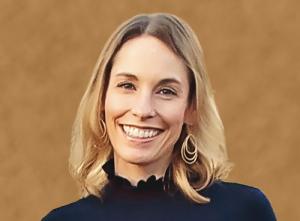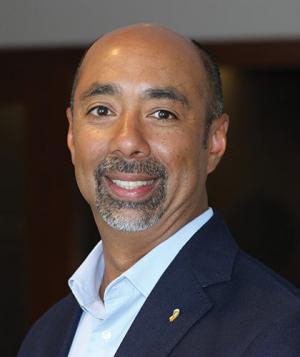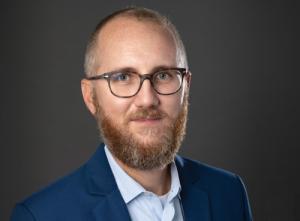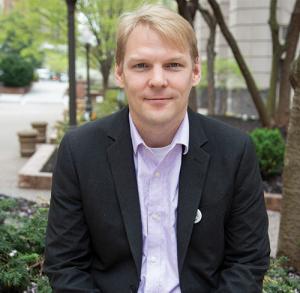Industry Heading?
Jennifer Wischnowsky is director – digital strategy and transformation at Ameren.
Ram Sastry is vice president – innovation and technology at American Electric Power.
Chris Gould is head of corporate strategy, chief innovation and sustainability officer at Exelon.
Roger Kranenburg is vice president – energy strategy and policy at Eversource Energy.
Keith Dennis is VP of consumer member engagement at National Rural Electric Cooperative Association.
They are dynamos. They are indeed generators, continuously converting their unique insights about the industry's present and future into innovative energy at their companies. These change agents are well known to their companies' executive leaders who savor their contributions to overall corporate strategy and operational execution. Jen Wischnowsky at Ameren. Ram Sastry at AEP. Chris Gould at Exelon. Roger Kranenburg at Eversource. And, Keith Dennis at the association of cooperative utilities, NRECA. As they stimulate change at their companies, for the benefit of the customers of those companies, they're changing the industry too. Who better to opine about where the industry is heading?

PUF's Steve Mitnick: What is your take on the current state of the electric power industry?
Chris Gould: Prior to the current atmosphere, there was a lot of momentum building around recognizing that the electric sector was the path through which we would be able to decarbonize the environment.
There was somewhat of a coalescing beginning to happen between all things technology policy, and customers were starting to converge around that vision. We were starting to think through ways that we can get there.
Of course, that's all been understandingly delayed with what's going on now. But for the industry, electrification and the opportunities that it provides are beneficial to customers. How technology and regulatory compacts need to evolve to be able to enable that vision was a positive movement.
 Jen Wischnowsky: Safety and security are and have been core values for Ameren – the coronavirus crisis and continued cybersecurity risks highlight the importance of our companies in operating the grid safely and securely.
Jen Wischnowsky: Safety and security are and have been core values for Ameren – the coronavirus crisis and continued cybersecurity risks highlight the importance of our companies in operating the grid safely and securely.
Keith Dennis: We're inextricably linked to quality of life and we are there for folks to help them meet their daily needs. In some ways, the less that people think about us, the better job we are doing. We're such an important part of what is going on in the country, and that makes our role essential to our communities.
Current trends are making this more apparent. We're increasingly aligning with consumer values that are outside of what people have normally expected. It's not only keeping the lights on, which is incredibly important to quality of life and daily life, but we're aligning more with increased environmental performance, for example.
We are also aligning with changes in consumers' lifestyles. This includes fun with electric vehicles and technologies, convenience with smart homes and connectivity to devices, putting the power in people's hands to save money through remotely turning off things in your house and better controlling them.
The value that the electric industry is providing to consumers continues to increase. At the same time, the cost of electricity in real terms has not gone up much. Folks are getting more value and it's not only great for their bottom line, it's important for their quality of life. We are doing well, and the state is strong for the industry.
 Roger Kranenburg: There is speeding up of a lot of trends like virtualization. More people are comfortable with virtual now than before, and you’ve seen the big emissions drop.
Roger Kranenburg: There is speeding up of a lot of trends like virtualization. More people are comfortable with virtual now than before, and you’ve seen the big emissions drop.
Jen Wischnowsky: While power has been an essential service for a long time, this is the most exciting time for the power and utilities industry. As an industry, we are undergoing a digital transformation that allows us to meet and exceed customer expectations.
Technology is integral to everything we do today and the explosion of smart devices and data lays the foundation for the integrated grid of the future that will enable two-way power flow, cleaner generation, and safer and more efficient use of resources and ways of doing business.
Safety and security are and have been core values for Ameren - the coronavirus crisis and continued cybersecurity risks highlight the importance of our companies in operating the grid safely and securely.
The other aspect of why it's such a great time to work in this industry is the opportunity to continue to improve the environmental, social, and governance impacts on our communities.
 Ram Sastry: A pandemic was low probability but had a huge impact, and we’ll debate this in time to come. These types of events where they’re low probability but large impact change the nature of how we operate.
Ram Sastry: A pandemic was low probability but had a huge impact, and we’ll debate this in time to come. These types of events where they’re low probability but large impact change the nature of how we operate.
Our companies are stewards of their communities, and I love working for a company in which the coworkers genuinely care about our customers, our community, and each other. At Ameren, we have a strong focus on diversity, equity, and inclusion - which has a positive impact on all three c's - customers, community, and co-workers.
Roger Kranenburg: The electric power industry, and this is globally, is well-positioned for future opportunity. To Chris's point, much of society's aspiration to decarbonize benefits the electric industry. A lot of the energy load shifts toward the electric industry, as you make that transition and transformation.
For the overall picture, the electric industry future looked good and continues to look good. There was a call with the head of the IEA, the International Energy Agency in Paris, and it was interesting. They usually focus on petroleum and much of the discussion was on petroleum. In closing the call, he was forthcoming on how important the electricity sector is as we evolve the global energy space.
That plays out in specific ways with issues we talk about such as electrification, not only of heat but importantly of transportation. Play that forward, and post-COVID, it's obvious: The world pre-COVID is different from the world post-COVID.
 Chris Gould: The load is shifting in dramatic ways from C&I to residential. People need power even more now, communications being one of the absolute keys in terms of being able to work virtually.
Chris Gould: The load is shifting in dramatic ways from C&I to residential. People need power even more now, communications being one of the absolute keys in terms of being able to work virtually.
How it's different will evolve over time. Even in that different world, the future state and where the electric power industry's position is in society is an important part. It will depend on changes to our pre-COVID views and some of the questions that are raised. Is the nonstop urbanization trend pre-COVID a sure thing, so to speak, and does that maintain post-COVID? I'm quite happy to be in the suburbs and I'm an urban guy.
There is speeding up of a lot of trends like virtualization. More people are comfortable with virtual now than before, and you've seen the big emissions drop.
Electricity has always been critical to society. Post-COVID, for society, there's more of a realization, or an emphasis, or a focus on how critical electricity is to our lives. It's essential for hospitals curing patients, and people being able to work from home. You compare this pandemic to that of the Spanish Flu of 1918, and society has a lot more tools available.
Yes, there's a significant part of society that's badly hurt. But compared to the tools we had at our disposal in 1918 we are in a much better position. Electricity is ubiquitous. Telecom's ubiquitous, and big parts of the economy and society are going forward.
 Keith Dennis: We’re going to see a lot of concern and support from co-ops, with our members, figuring out how to collectively handle and recover from what is a completely historic challenge.
Keith Dennis: We’re going to see a lot of concern and support from co-ops, with our members, figuring out how to collectively handle and recover from what is a completely historic challenge.
Ram Sastry: I have to reiterate what the others have said. I've been amazed and now scratch my head. Why did we need to do all these in-person meetings at that huge cost if the virtual format works so well? It's going to cause a lot of introspection.
A pandemic was a low probability but had a huge impact as we're seeing, and we'll debate this in time to come. These types of events where they're low probability but large impact change the nature of how we operate.
Climate change and sustainability are also like that except they don't happen as quickly, but they will have a large impact. For our customers, and the industry, the technology and policy have gotten to a point where we can get to a more decarbonized, electrified economy in transportation, heating in buildings, and chemical processes. That will continue. I don't know if some parts of it will accelerate as a result of this current pandemic. Some parts will decelerate, but nothing will stop.
I had an old boss that used to say, never let a crisis go to waste. Some of what Chris, Roger, and others have said is, we are going to do more remotely. We're going to use more software to automate. We're going to use things where we needed an operator to look, touch, and operate, but that can now be done remotely. We've got a more flexible system that'll allow the growth of the grid to be grid 2.0.
PUF: Chris, your utility is large. A lot of the great cities of the country are served by Exelon utilities. How is that being affected?
Chris Gould: It was a common theme even before all of this. Electrification was going to put increasing demands for reliability and resilience on the grid, if you're depending on it for so much more of what society needs. That was already the trend.
Of course, to be specific, we had storms that just came through the East Coast last week, in particular, to the D.C. area, where we rolled trucks from the other utilities and made sure we were as responsive as possible in this environment, because we know the bar has been raised significantly from a customer need perspective.
The load is shifting in dramatic ways from C&I to residential. We know people need their power for all of the things they used to need, but they need it even more now, communications being one of the absolute keys in terms of being able to continue working virtually. It doesn't happen unless we're able to provide reliable power.
PUF: Keith you uniquely are at NRECA, and you have members across the country. A lot of them are not urban. They're rural. How is their situation being affected?
Keith Dennis: It's completely uncertain where we're going to be in the future. It's important to know that we don't know. I suspect that we are going to see a lot of changes.
We'll see changes in energy use patterns. We'll see businesses that don't come back up. We'll see a lot of folks who are unemployed and having trouble paying their bills.
We're going to see a lot of concern and support from co-ops, with our members, figuring out how to collectively handle and recover from what is a completely historic challenge.
Areas will be hit differently. Some might be impacted a lot less than others. We don't know yet. It's interesting for us because a lot of our co-ops are residential. We have a lot of folks who will be at home potentially during this COVID event, and we'll see changes in energy use.
Electricity's something you don't necessarily think about unless you have to, and one of the times you think about it is if you're having trouble paying the bill. That could create an interesting dynamic around consumer engagement.
We also serve a lot of commercial and industrial locations where businesses aren't up and running. There could be all sorts of impacts as a result. But most important, we're going to see a level of consumer engagement throughout the recovery that is going to make a difference to the rural economy.
At the end of the day, we're going to have all sorts of opportunities to help folks with the same types of services that we always have - energy efficiency, electrification, managing bills, and trying to make sure that the community is strong. We may go back to our roots on that within our communities and rural areas.
PUF: Roger, Eversource is serving much of Connecticut and Massachusetts, some of the hardest hit areas thus far. How is that going to shake up the industry?
Roger Kranenburg: We've got a diverse territory. We've got Boston that's the big urban center, then it goes to the north country of New Hampshire.
I have admired how the overall industry has responded and adapted in this crisis. I would make the argument that the utility industry was one of the best prepared because there's a culture of incident response. It was like, okay, pull the pandemic plan off the shelf. Execute.
There were some hiccups, but it also accelerated some of the things that were taking a little longer. People are now comfortable with leveraging Teams and Skype, and we accelerated a trend to virtualize our call centers. It was amazing how quickly that accelerated.
Overall, hats off to the industry for responding so well, and it's been recognized by customers and policymakers. Wow, these guys had it together. They had the plans laying there, sitting there, waiting, ready to go, and they executed on them very well.
We've gotten a lot of good attention. We've got to leverage that and keep it up. One of the stories I would like to share is there's someone from the equipment side of the industry I've known. She sent me an email and was like, hey, the electricity's out, and I've got three girls at home trying to remotely work. Can you give me an idea when it'll come back on? It was a funny moment. I drove over and dropped off some cellphone batteries for her. Electricity is critical, especially now, because everyone's home. They're going to virtual schools and also using telecom.
Another story is when my family freaked out because of the storms that Chris was mentioning. We had a big windstorm. My lights went on and off several times over a few minutes and then the internet went down. The entire family ran into my office, saying, fix it!
In China, when the pandemic went through, a lot of their load went down. A lot of their commercial, industrial levels dropped. With the exception of communications and data centers, which jumped twenty-six to twenty-eight percent.
you look at where the focus is going to be because of COVID-19, it's amazing how many times people talk about RNA and DNA now on the news. There's going to be a lot of focus on biosciences and data centers.
In addition to the foundations of our industry of reliability, resiliency will be a focus. The electricity has to be there. Power quality is also going to be more at the forefront, typically an urban issue, but it's also heavily a rural issue.
I remember, up in New Hampshire, chatting with some folks. There are some smaller industries there, and electricity prices are high. But the small business community is emphasizing to me how devastating low power quality would be in their operations.
PUF: Ram, American Electric Power has a broad vision of the country. You're in about thirteen States. Is there diversity in how AEP's affected and how you think our industry is affected?
Ram Sastry: Many of my comments are common to what's already been said, but we serve customers in Ohio and Texas that are part of the shale oil industry. For the first time ever, that I can remember, we have negative oil prices for delivery. That load is being impacted dramatically.
Load is down now, for obvious reasons. As conditions get better, the social distancing rules will be in place for quite some time, and a lot of us will change the way we work, socialize, interact, and commute. We're going to do more remotely now that we've seen it works well. That has a long-term impact on industrial activity, and commercial activity, a bump up a little on residential activity.
I will echo what the others have said, that when you have in this uncertain time, customers and entire states locked down and told to shelter in place, having reliable power, and even if you have lost your job, not being worried about it being cut off, would give lots of our customers great comfort. When we do have minor weather events, we do the restoration safely, efficiently, and effectively.
People have seen that, and we've got good reviews, and good customer feedback on that aspect, and we'll continue that. A lot of work internally that we thought we needed to do in person, we've found we can do it remotely using virtual remote tools. If we can do it, many other companies and organizations have discovered it too.
The world, going forward, will be different, and in some ways much better, and in some ways, we have lost something we're not going to get back. But it's forward progress as we go through this. Technology is continually rising up to the task to help solve many of the problems.
I've been amazed at how the data and telecom infrastructure that sits on top of the electric infrastructure, has held during this complete switch around of where and how people work.
PUF: Jen, is the industry and regulation of it going well or not and in what ways?
Jen Wischnowsky: We have seen positive changes in our regulatory frameworks that allow us to prudently invest in improving the reliability of the grid, build renewable generation resources, increase energy efficiency, and promote economic development and efficient electrification in our region. These more modern regulatory frameworks that reduce regulatory lag and allow us to fairly recover our investments are important for our customers and shareholders - our reliance on energy continues to increase and access to capital is important for us to build the grid of the future.
PUF: Where will the industry be in five years?
Chris Gould: Just building on what everybody has said here, I already laid out the need for power quality and for higher levels of reliability. You have to believe there are going to be more virtual meetings. Some level of the heightened expectations that we are observing now will continue into the future.
We'll be past it, but there'll be structural changes in the way we work and the way we engage with each other, that will put more opportunity and more challenge on the electric sector to be affordable and clean, and yet provide higher levels of reliability and resilience that'll be needed for society.
We will continue to see the same renewables, growth, DER, customer enablement, and transition of these other sectors into electricity. The stakes get higher when you add in the need for the grid in terms of communications, the new face of work, and personal engagement.
PUF: We're counting on you Chris and Exelon, if only because you power five of the Major League Baseball teams and we expect full stadiums, well-powered by then.
Chris Gould: That's right. We're up for it. There's a culture of incident response. But we'll be there, and it further emphasizes the direction we're going. It doesn't change the fundamental course.
Keith Dennis: We're going to continue to, for lack of a better term, gain on market share or an invisible creeping market share into different areas of folks' lives. I don't mean we're going to have a bigger presence in everybody's mind, but we're going to have a bigger footprint with the different types of electric technologies we are powering.
Every year, folks are getting more electric things, whether it's electric scooters, toys, cars, or space heating.
There are rebates and pushes in different states for increasing electric technology adoption. It's an interesting phenomenon because these are efficient products that are being adopted. It doesn't necessarily mean there's going to be a lot more load. But it means that electricity use will spread out into areas where we've never been.
For example, we will be seeing some presence in transportation with school buses, transit buses, and fleets - and it's going to keep growing.
We've seen some strong, persistent trends in the industry over the past two decades. We've seen battery prices come down, and we've seen increases in connected products. With that, we have seen all sorts of new electric devices coming online. At the same time, we've seen twenty-nine percent emissions reduction per kilowatt hours since 2005.
I suspect that in the coming years those trends are going to continue. Whether or not they do, there's enough momentum to pull us into new areas that we haven't traditionally been in within the past decades.
Jen Wischnowsky: There has been an important shift in recent years to become more customer-centric and that will continue, enabled by the digital transformation happening in the industry.
At Ameren, our strategy hasn't changed, and our customers remain at the center of everything we do. We will continue to execute our strategy to meet and exceed customers' fundamental expectations around reliability and affordability, while providing a distinctive customer experience focused on convenience, choice, and corporate social responsibility.
Underlying those concepts, you hear a focus on making our operations more efficient, investing in self-healing technologies on the grid, using data to improve reliability, and communicate real-time with our customers in their channel of choice, all while improving our impact on the environment.
Another significant change is happening in our workforce as longer tenured coworkers are retiring and more Millennials and even Gen Z coworkers are joining our teams. Our changing workforce has different expectations and we need to continue to evolve our benefits and policies.
Technology will help us here too - allowing our coworkers to work anywhere, anytime, from any device will help lay the foundation for more flexible work arrangements. As a working mom, I'm excited about our opportunity to continue to improve our work environments in ways that will promote more diversity, equity, and inclusion for our coworkers.
Roger Kranenburg: There'll be slightly different tweaks here and there in electric vehicles and wind from what I would have viewed it to be a few months ago, but it's overall a great story and a great picture. We're proud of that.
One of the batteries we're building now and we're still on track, amazingly so, is to commission a thirty-eight-megawatt hour battery for Provincetown, at a tip of the Cape. That is for resiliency. It powers the entire town for a short amount of time until we can fix the lines. It goes into that reliability, power quality, and resiliency for electricity.
Some of what will be different is they'll be more focus on reliability, resiliency, power quality, and support for our grid mod type investments, including things that we were looking to do for our control rooms in making them more robust. We'll get a lot of public policy support for those.
Some of the questions could be the change in the focus of policymakers, who have a lot on their plates right now. I've been impressed at how well policy has continued to move forward, including at the town level. I've been impressed at how government has gone forward and continued to do their work.
Policymakers have a significant amount of debt that's being piled on. My best guess is at least four to five trillion at the U.S. level alone. However, as my former colleague would say, we're still the best-looking horse at the glue factory.
We have to be cognizant of the policymakers' world. They'll be more focused on public health and some of that could play into our industry, but it shifts their focus and attention. I believe that the clean energy movement will continue.
For some of the positives, I was on another call, I can't remember what city it was, but the person on the call was like, oh, things are good. You know, it's quiet and we can see the hills. We've never been able to see the hills in this city.
One of the positives that may arise is society may come to the realization that, we kind of like this clean air, this clean environment, and we want it.
We think of greenhouse gases, but the benefits of electric vehicles and other clean investment is also conventional air quality. Society may say, we like that. With the virtualization of a lot of things, some of the benefits are environmental when we get on the other side of this.
The other positive is when you get these big shocks to systems, the systems change direction, and it can create opportunities, for example yes, we want to focus on continuing and maybe even accelerating this clean transition transformation of the broader energy space, and that benefits electricity.
Ram Sastry: I will use a risk lens. I use the term risk because people take it as a negative connotation, but it's also an opportunity. If you look at the landscape today and what's going to accelerate our move to a cleaner, more sustainable supply environment and the ability to use lots of resources at the load side, it is software, AI, automation, and digital technology.
Those are going to be accelerated in the environment we find ourselves in, where we want to do more electrification for a variety of risk factors, with climate being one of them. It will be the ability to be confident in knowing that will be available when I need it.
With resiliency, everyone is going to look at whether they had plans or not before this. This is a risk shock to most organizations, and some will survive this, but many won't. Many will not come back from it, but those who do will be looking at the plans saying, what do I have to do to be a more resilient organization?
How do I ensure my resiliency, not just for pandemic risks, but other risks? The utility is in an interesting position to help on both those fronts. Electrification and decarbonization are on one side and a resiliency and more risk aware organization are on the other side.
That's providing a lot of, at least electric, infrastructure that allows for a more resilient supply to our customers or to segments of customers that would like it. In 2025, we'd have more of that than we would normally because they're accelerated by these things.
But the low gasoline prices may slow the rollout of customer EVs. Maybe fleets and transit vehicles will electrify, but maybe other things will go slower because people who were making the calculation based on the price of gas tend to wait.
There may be a deceleration on some things, but over time we'll get back to where we are now, and we’ll make progress in other areas related to electrification and resiliency.


